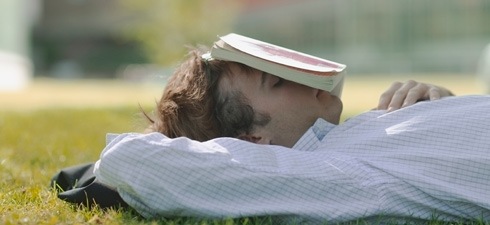 “Are Europeans lazy? Or Americans crazy?” This is the title of remarks by Stephen Nickell from the Bank of England in 2006. The paper perfectly sums up the notion that Europeans generally work less than Americans, take more holidays and sick leave, and retire earlier.
“Are Europeans lazy? Or Americans crazy?” This is the title of remarks by Stephen Nickell from the Bank of England in 2006. The paper perfectly sums up the notion that Europeans generally work less than Americans, take more holidays and sick leave, and retire earlier.
The atheist sloth ethic
To know who’s really lazy or crazy, we have to answer a different question first: why do we work? The economist Thorstein Veblen addressed the question in 1899 in his classic and scathing work The Theory of the Leisure Class. People don’t work just to scrape by, but also to show off their social rank by indulging in the “conspicuous consumption” of status-laden goods like clothes and houses. The prevailing notion on either side of the ocean is that Europe has given up that irrational pursuit: Europeans lounge around while Americans hustle and bustle. And there are plenty of statistics to back it up.
According to the OECD, Americans work on average 25 hours a week, as against a little over 17 hours for the Belgians, French and Italians. The Dutch, Italians and Germans get twice as much time off on holiday as Americans. 43% of Americans age 60-65 still work, compared to only 12% of Belgians, French and Italians, and so on and so forth. Needless to say, that prompts plenty of criticism and ridicule on either side of the Atlantic. And who could be in a better position to slam European sloth than a British expat in the US like historian Niall Ferguson, in his essay “The atheist sloth ethic, or why Europeans don’t believe in work”.
Europeans are fully capable of working more
What’s more striking is that serious analysts rarely talk about “laziness”. The reason is simple: European laziness may seem an alluring explanation for the observed differences, but the statistics tell a different story. The fact that Europeans work less isn’t due to laziness, but to a voluntary trade-off, says Andrew Moravcsik, a political scientist at Princeton and Newsweek contributor. The unemployment levels distort the figures: the US has known lower unemployment than Europe for the past ten years and a smaller non-working population. So it’s logical that the “average European” should put in fewer hours.
According to Moravcsik, Europeans are fully capable of working more, but they opt to spend more time at leisure than at making money. Economists say that trade-off gets more prevalent as a society gets richer. Americans, however, are the exception to the rule. The US, he continues, is the only developed, industrialised country in which working hours have increased enormously.
Southern Europe’s inactive population
The idle European may live on in the collective imagination, but he’s actually a fictional character. The same goes for the venomous, demagogic image of the lazy southern European broadcast lately by Western European media and establishment. In a word, Western Europeans accuse Southern Europeans of the same thing Americans accuse them of. But that is wholly unfounded: Spanish, Italians and Portuguese work much longer hours than the Dutch.
The problem in southern Europe isn’t the active population, but the size of the inactive population. In Europe, argues Simon Tilford, chief economist at the Centre for European Reform think tank, many let others foot the bill for their time off. For example by claiming, in the name of social justice, early retirement for which they have not paid contributions. It’s absurd, he says.
In the long run, Tilford continues, the European model of exchanging money for leisure time is in jeopardy. This exchange has to be braced by a stable source of economic growth, which is currently absent. For a long time, European productivity was on the rise. When that gradually came to an end, some countries financed their growth by borrowing, others by boosting exports. But those are ways of generating growth to the detriment of others, they are not a real solution for Europe. Governments aren’t stimulating growth either, they’re all in the process of retrenching. So the solution has to come from productivity. If Europeans succeed in growing their productivity, concludes Tilford, they can continue cultivating their love of leisure.
GERMANY
The discreet charm of unemployment
The German press has been focussing recently on a group of “eternally unemployed” who for decades have been living off the state, reports Gazeta Wyborcza. Some, the Warsaw daily notes, receive up to €1,085 per month which is enough for food and accommodation, and still leaving some for leisure and entertainment, or even a short vacation on the Baltic coast. The last time Arno Dübel, 54, had a job was twenty seven years ago. Every month he receives a cheque for 359 EUR and the state also pays rent for his two-room flat in Hamburg. According to him, being unemployed has nothing but advantages: he doesn’t have to follow anyone’s orders, doesn’t get stressed, doesn’t have to get up early. So what does he do during the day? Shopping at Lidl, walking the dog, watching some TV. “Working is a beautiful thing when others do it. I’m no good for it,” says Mr Dübel with disarming honesty. No wonder Bild tabloid has called him Germany’s “cheekiest” jobless person. There are many more like him in Germany, points out the Warsaw daily.
Was this article useful? If so we are delighted!
It is freely available because we believe that the right to free and independent information is essential for democracy. But this right is not guaranteed forever, and independence comes at a cost. We need your support in order to continue publishing independent, multilingual news for all Europeans.
Discover our subscription offers and their exclusive benefits and become a member of our community now!












